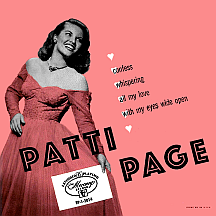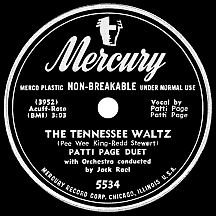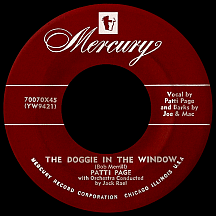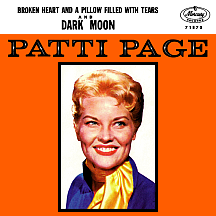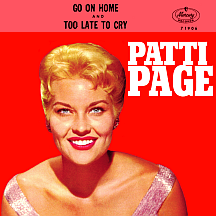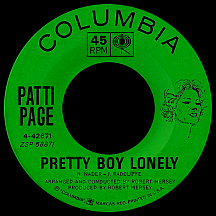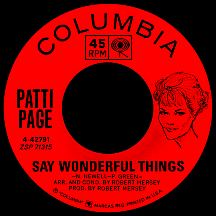PATTI PAGE
"The Singing Rage...Miss Patti Page!" It's doubtful the young Clara Ann Fowler could have imagined she would one day be described in such a way, or be part of an experiment later considered an important moment in music history. Yet there she was, 20 years of age in December 1947, a guinea pig for experiments in multitracking, the central focus of the first popular recordings designed to make a solo vocalist sound like two singers...or four!
"Confess" was the springboard to a career that rose to heights few have known; in the early '50s she reigned as mainstream music's queen by way of her Patti Page persona, having wrested the crown from Dinah Shore while holding at bay a bevy of bewitching pop divas including Jo Stafford, Kay Starr, Teresa Brewer, Rosemary Clooney and Mercury labelmate Georgia Gibbs...some established, some up-and-coming, but none able to catch up to her in record sales or public demand. One of eleven children, Clara's father worked for the railroad and her mother picked cotton; Claremore, Oklahoma was her birthplace and home until the family moved to Tulsa around the time she hit her eleventh birthday. As Ann Fowler she took advantage of an opportunity to sing on a daily 15-minute radio show on local station KTUL. Sponsored by the Page Milk Company (headquartered in nearby Coffeyville), they had employed a young singer (whose identity is unknown) and given her the name "Patti Page" after the brand; when she left, Clara volunteered to replace her. Proving she had the talent to pull it off, she took the name and few if any listeners were the wiser.
Al Clauser and his Oklahoma Outlaws performed on the show and in 1946 she sang with them on her first recording, "My Sweet Papa," a country release on the Skyline label. She asked the milk company's owner, Jim Page, if she could use Patti Page permanently and he said she could...no strings attached! Before long she joined Jimmy Joy's orchestra out of Dallas, Texas, touring with them throughout the midwest; Jack Rael, a saxophonist for Joy's band, became her manager. Moving to Chicago in '47, she continued working on radio and sang briefly with Benny Goodman's big band, which led to a contract with Mercury Records, a two-year-old Chicago-based label already gaining industry buzz with hot new singer Frankie Laine. Her first single for Mercury, "Every So Often," was one of four sides recorded with Eddie Getz's Orchestra.
The George Barnes Trio backed her after that, taking part in the late '47 session that spawned her sixth Mercury single, a real attention-grabber. "Confess" (written by Bennie Benjamin and George David Weiss), a song designed as a duet, was already out in a version by Doris Day and Buddy Clark; Rael suggested they dub Patti's voice twice, though the company's producers and engineers weren't sure it could be done. With A&R director Mitch Miller's help, they accomplished it by recording two separate acetates for her lead and backing vocals, syncing them together onto one master disc...a painstaking process.
The competing versions of "Confess" went neck-and-neck in the summer of '48, each reaching the top 20, but it was Page's that sparked the curiosity of listeners puzzled by the sound of someone singing a duet with herself, a sonic stunt disc jockeys played up big. It was the first commercial example of an overdubbed recording (though experiments had taken place, without much in the way of useful results, since the 1920s); Les Paul had been developing his own multitracking techniques using magnetic tape, achieving similar results soon afterwards, taking what Patti's people had pulled off to an advanced level (through reverb, phasing and other tape trickery) with his solo instrumentals and extremely popular vocal recordings with wife Mary Ford.
Several more discs were released by Patti that year, some using the two-track technique; a duet with Vic Damone, "Say Something Sweet to Your Sweetheart," sidestepped the gimmick, though "Money, Marbles and Chalk" was double-tracked and landed her on the country charts in May 1949. Then Miller and Rael challenged themselves further, doubling the difficulty with the Mack Gordon-Harry Revel song "With My Eyes Wide Open I'm Dreaming," featuring four separate singers-in-one! The label credited the Patti Page Quartet and also read: Voice by Patti Page Patti Page Patti Page Patti Page (no other artist I know of has been credited five times on one record label). People were amazed. In early 1950 it became her best-selling hit to that point.
Bigger things were coming...much bigger. But first she had to go through the uncertainty of releasing record after record without a follow-up hit (one song, "What's Wrong With Me?," would seem to sum up her frustration). Several singles (including another duet with Damone, one with Laine and two with country singer Rex Allen) failed to gain traction; Rael began conducting the orchestra on Patti's sessions during this period. "All My Love (Bolero)" broke the streak for good. Based on a French song (music by Paul Durand with lyrics by Mitchell Parish), it was a favorite of deejays (a number one airplay record the entire month of November '50) and reached number two on the sales charts...without the benefit of overlaid vocal razzle-dazzle!
Of course, they weren't about to abandon the sound that had by that time become Patti's trademark. The next release was a pop take on Leon Rene's "Boogie Woogie Santa Claus" (previously an R&B hit for Mabel Scott in '48), but the Christmas disc was quickly flipped and its B side was suddenly the sensation of the holiday season. "Tennessee Waltz," written by Pee Wee King and Redd Stewart, was one of 1948's biggest C&W hits in its original version by King and his Golden West Cowboys as well as a cover by Cowboy Copas; Patti's remake (titled "The Tennessee Waltz") hadn't been earmarked for airplay, but once exposed there was no turning back. Her double-tracked voice, set against a softer pop arrangement, was irresistible; the record hit number one in December '50, staying on top through February '51, selling millions on the way to becoming the biggest hit of 1951 overall. Competitors came from all directions with their own versions: Stafford, Guy Lombardo (with vocalist Kenny Gardner), Les Paul and Mary Ford, Erskine Hawkins, The Fontane Sisters and Anita O'Day each claimed a much smaller piece of the pie. Spike Jones and his City Slickers mangled the lyrics on a particularly absurd parody of the song. Stick McGhee had a strong showing on the R&B charts with his instrumental reworking, "Tennessee Waltz Blues." Patti's later efforts were often set at various points on the U.S. map as she began racking up hit after hit.
Her rendition of Harold Spina and Bob Russell's "Would I Love You (Love You, Love You)" went top ten while "Waltz" was still at the apex. Yet another single, "Mockin' Bird Hill" (penned by Vaughn Horton), appeared and racked up sales for Page, Paul and Ford and country band The Pinetoppers with vocals by The Beaver Valley Sweethearts. For several weeks in March and April 1951, Patti had three simultaneous hits in the nation's top ten. The intriguingly slow-fast-slow tempoed "Mister and Mississippi" (written by Irving Gordon, it was also a major hit that year for Tennessee Ernie Ford) came next, then Paul Westmoreland's "Detour" ('...there's a rocky road ahead!'), a multi-artist country hit five years earlier, and the Patti-times-four ballad "And So to Sleep Again," rounded out a blockbuster year for the softly ragin' Miss Page.
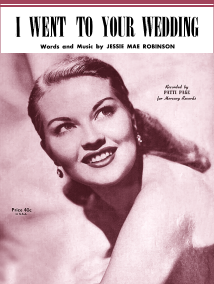
The first three singles of 1952 seemed to take a "Detour," each unexpectedly failing to reach the top ten. During the summer she starred in her first TV series, Music Hall, an unassuming variety filler that followed the CBS nightly news in the 7:45 to 8PM time slot on Tuesdays and Thursdays. She was back on the chart-topping track soon afterwards with the sad and forlorn "I Went to Your Wedding" (composed by Jessie Mae Robinson, one of the most successful black female songwriters of the era). It spent several weeks at number one in the fall; Spike Jones once again aimed an arrow in Patti's direction with yet another parody hit (same title again) featuring a giggle-filled vocal by Sir Fredric Gas (a silly pseudonym for Earl Bennett). Patti's flip side to "Wedding," "You Belong to Me," came on the heels of Jo Stafford's number one hit version and served mainly as a treat for fans more enamored of Page than the slightly more mature Stafford; the next single served a similar purpose as she covered younger newcomer and soon-to-be major star Joni James' "Why Don't You Believe Me," again winding up as an also-ran to a competing songstress's chart-topper.
Despite the massive popularity of "The Tennessee Waltz," her next release, "The Doggie in the Window," is perhaps the song Patti Page is best remembered for, its cuteness lingering in pop culture (writer Bob Merrill had a predilection for novelty lyrics, resulting in some of the decade's more clichéd, and popular, standards); dog yaps and funny "robber" barks were provided by members of the band at the original session. The cartoonish tune captured the nation's imagination; a pet lover's delight, it held the number one spot on the national charts for two months from March until May of '53. Country knuckleheads Homer and Jethro took humorous liberties this time, scoring the biggest hit of their long and loony partnership with the pop and C&W hit "(How Much Is) That Hound Dog in the Window."
The hits kept coming at a steady pace; Patti's top sellers of 1954 included "Changing Partners," Benjamin and Weiss's "Cross Over the Bridge," "Steam Heat" (from the blockbuster Broadway show The Pajama Game, with music by Richard Adler and lyrics by Jerry Ross) and "What a Dream" (a cover of Ruth Brown's R&B hit "Oh What a Dream," written by Chuck Willis). At the end of the year she covered "Let Me Go, Lover!" (adding an exclamation point to the ultra-emotional, million-selling early '55 hit by Joan Weber).
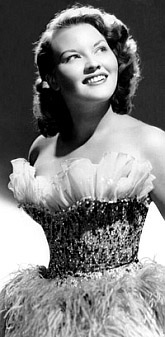
The top television networks took turns as Patti starred in three different variety shows during the latter half of the 1950s. The Patti Page Show ran on NBC for just four weeks in 1956 as an hourlong Saturday night summer replacement for Perry Como's long-running series. CBS brought her back in the fall of '57 for The Big Record, a music-only 30 minute program featuring popular (non-rock and roll) artists performing their biggest hits; on the air nine months, it was the longest of her four series. She completed her boob tube quaternion with ABC's The Patti Page Olds Show, another half hour series, running from September '58 through March '59. Top selling, and memorable, recordings during this period include Al Hoffman and Dick Manning's sentimental throwback "Allegheny Moon," a dreamlike tribute to "Old Cape Cod," the brainchild of one-time-only Boston songwriter Claire Rothrock (which worked wonders for Massachusetts' oceanside tourist trade), and "Left Right Out of Your Heart," gaining attention with its marching beat, marginally military phrases and catchy 'Hi-lee-hi-lo-hi-lup-up-up' hook.
Patti transitioned to the silver screen with an acting career that spanned just three feature films. There was a small role as a nun in Elmer Gantry, the 1960 film that landed Burt Lancaster his Academy Award for Best Actor. The following year she had her only leading role (opposite future Fugitive David Janssen) in the critically derided Dondi, based on a newspaper comic strip built around the juvenile title character. An underwhelming performance in 1962's Boys' Night Out (supporting stars Kim Novak, James Garner and Tony Randall) was, at least, notable for her hit recording of the movie's theme. These three films awkwardly demonstrate that acting was not her forte; other than a couple of small television roles she went back to what she did best, though even when it came to singing, hit songs were much harder to come by in the early '60s.
With Jack Rael still managing her, she parted ways with Mercury Records in 1962 after 15 mostly-lucrative years. Signing with Columbia, she kicked off a string of Robert Mersey-produced pop tunes in early '63 with "Pretty Boy Lonely," achieving only minor success for the next two years. Her only real hit for Columbia came with the theme from the creepy suspense flick "Hush, Hush, Sweet Charlotte" starring Bette Davis and Olivia de Havilland. A top ten hit in the spring of 1965, the song garnered an Oscar nomination for its composers, Frank DeVol and Mack David. Later in the decade Patti returned to her first love, country music, finding acceptance initially with pop music buyers; covers of country smashes made famous by Glen Campbell ("Gentle on My Mind"), Roger Miller ("Little Green Apples") and Tammy Wynette ("Stand By Your Man") were hits on the Easy Listening charts in 1968.
From that point on, Patti Page focused entirely on country music, returning to Mercury after leaving Columbia in 1970 and gradually winning over country fans with her recordings for Epic, Avco and Plantation throughout the 1970s and early '80s. Her career after this was mainly on stage, performing country songs and her many pop hits at shows all around the U.S. She settled in the San Diego area in the 1970s. All the while, Patti's private life proceeded quite normally; though married three times, there are no wild stories, nothing to set her in the context of an unfortunately high percentage of her contemporaries. She simply loved what she did and managed to balance work with play, fame with family, for more than six decades.
NOTABLE SINGLES:
- My Sweet Papa - 1946
with Al Clauser and his Oklahoma Outlaws - Confess - 1948
- Say Something Sweet to Your Sweetheart - 1948
with Vic Damone - So in Love - 1949
- Money, Marbles and Chalk - 1949
- With My Eyes Wide Open I'm Dreaming - 1950
as Patti Page Quartet - I Don't Care if the Sun Don't Shine - 1950
- All My Love (Bolero) - 1950
- The Tennessee Waltz - 1950
- Would I Love You (Love You, Love You) - 1951
- Mockin' Bird Hill - 1951
- Ever True Ever More /
Down the Trail of Achin' Hearts - 1951 - Mister and Mississippi /
These Things I Offer You - 1951 - Detour - 1951
- And So to Sleep Again - 1951
- Come What May - 1952
- Whispering Winds - 1952
- Once in Awhile - 1952
- I Went to Your Wedding /
You Belong to Me - 1952 - Why Don't You Believe Me - 1953
- The Doggie in the Window - 1953
- Butterflies /
This is My Song - 1953 - Changing Partners - 1953
- Cross Over the Bridge - 1954
- Steam Heat - 1954
- What a Dream /
I Cried - 1954 - The Mama Doll Song - 1954
- Let Me Go, Lover! - 1955
- Everlovin' - 1955
- Croce Di Oro (Cross of Gold) - 1955
- Go On With the Wedding - 1956
- My First Formal Gown /
Too Young to Go Steady - 1956 - Allegheny Moon - 1956
- Mama From the Train /
Every Time (I Feel His Spirit) - 1956 - Repeat After Me - 1957
- A Poor Man's Roses (Or a Rich Man's Gold) /
The Wall - 1957 - Old Cape Cod /
Wondering - 1957 - I'll Remember Today - 1957
- Belonging to Someone - 1958
- Another Time, Another Place - 1958
- Left Right Out of Your Heart - 1958
- Fibbin' - 1958
- Trust in Me - 1959
- The Walls Have Ears - 1959
- Goodbye Charlie - 1959
- The Sound of Music - 1959
- Two Thousand, Two Hundred, Twenty-Three Miles - 1960
- One of Us (Will Weep Tonight) - 1960
- I Wish I'd Never Been Born - 1960
- Don't Read the Letter - 1961
- A City Girl Stole My Country Boy /
Dondi - 1961 - Mom and Dad's Waltz /
You'll Answer to Me - 1961 - Broken Heart and a Pillow Filled With Tears - 1961
- Go On Home - 1962
- Most People Get Married - 1962
- The Boys' Night Out - 1962
- Pretty Boy Lonely - 1963
- Say Wonderful Things - 1963
- Hush, Hush, Sweet Charlotte - 1965
- You Can't Be True, Dear - 1965
- Gentle on My Mind - 1968
- Little Green Apples - 1968
- Stand By Your Man - 1968


